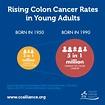In conclusion, the rising incidence of colon cancer among young adults in India is a cause for significant concern, as highlighted by recent studies, including the one conducted by the Delhi State Cancer Institute. This shift in the disease’s prevalence towards individuals aged 31-40 reflects a changing epidemiological landscape.
Lifestyle factors, such as high cholesterol, a family history of colon cancer, and increased alcohol consumption, have been identified as contributing elements by experts like Dr. Vinay Bhatia. This underscores the importance of adopting preventive measures, including a balanced diet, moderate alcohol consumption, smoking cessation, regular exercise, and maintaining a healthy weight.
The global impact of colon cancer, ranked as the third most common cancer and the second leading cause of cancer-related deaths by the World Health Organization, necessitates a proactive approach. Early detection through screening, involving various diagnostic methods, remains crucial for effective treatment and improved outcomes.
Dr. Vinay Bhatia’s recommendations for average-risk individuals in India, advocating for yearly fecal occult blood tests (FOBT) and 10-yearly colonoscopies starting at age 40, provide a strategic framework for combating the expected burden of colon cancer. Emphasizing comprehensive medical practices, including thorough clinical examinations and timely referrals to specialists, becomes essential in safeguarding against colon cancer, particularly among the younger generation.



